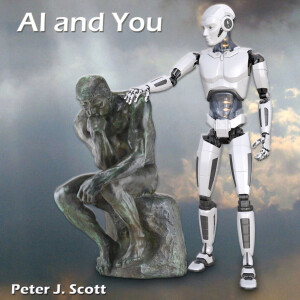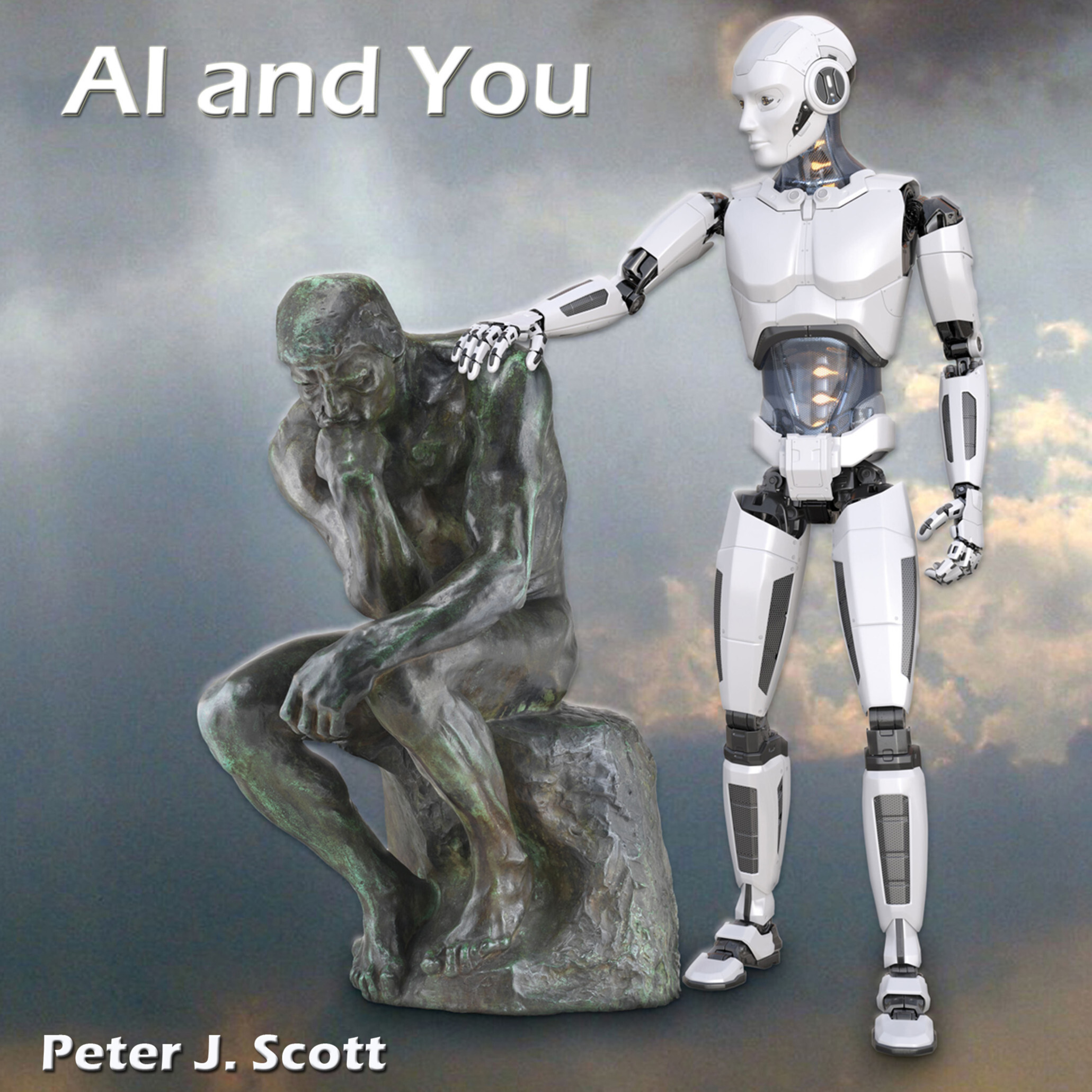Episodes

9 hours ago
9 hours ago
This and all episodes at: https://aiandyou.net/ .
|
It's that time to visit the - ghosts? - of AI past, present, and future, in our traditional retrospective/predictions episode. Forming the panel are Dan Turchin, CEO of PeopleReign, the AI platform automating HR and host of the “AI and the Future of Work” podcast. And Richard Foster-Fletcher, the Founder and Executive Chair of MKAI, the inclusive Artificial Intelligence Community, and leader of the MKAI Centre for Digital Trust and host of the Boundless podcast. Both have been on the show before, as guest experts and year-end panelists, and both are good friends. We'll talk about surprises from 2025, ways companies have used AI productively and ways it has been oversold, whether an AI bubble may pop next year, what'll happen next with AI slop, and how much AI may advance human progress next year and the emergence of AI nation states. All this plus our usual look at today's AI headlines. Transcript and URLs referenced at HumanCusp Blog. |
 |

Monday Dec 22, 2025
288 - Guest: Suzanne Gildert, Quantum Entrepreneur, part 2
Monday Dec 22, 2025
Monday Dec 22, 2025
This and all episodes at: https://aiandyou.net/ .
|
What is consciousness? That’s a profound question that many would say is unanswerable. And how could you make artificial consciousness? That’s a more profound question that many would say is impossible. We are talking with Suzanne Gildert, founder of Nirvanic, a Quantum-AI research company, who is not just talking about consciousness, she’s doing something about it. She is a prolific inventor with more than 60 US patents in quantum computing, humanoid robotics and artificial intelligence. Suzanne has a PhD in experimental quantum physics and was the founder of two robot companies, Kindred AI, and Sanctuary AI. At Nirvanic she seeks to understand consciousness and innovate conscious AI using quantum computing. In the conclusion of our interview, we talk about how robots will use quantum computing, world models and what robots really can and can’t do right now, form factors for robots, and the connection between robot consciousness and finding our purpose in the world. All this plus our usual look at today's AI headlines. Transcript and URLs referenced at HumanCusp Blog. |
 |

Monday Dec 15, 2025
287 - Guest: Suzanne Gildert, Quantum Entrepreneur, part 1
Monday Dec 15, 2025
Monday Dec 15, 2025
This and all episodes at: https://aiandyou.net/ .
|
What is consciousness? That’s a profound question that many would say is unanswerable. And how could you make artificial consciousness? That’s a more profound question that many would say is impossible. Tackling both of those head-on is Suzanne Gildert, founder of Nirvanic, a Quantum-AI research company. She’s not just talking about consciousness, she’s doing something about it. She is a prolific inventor with more than 60 US patents in quantum computing, humanoid robotics and artificial intelligence. Suzanne has a PhD in experimental quantum physics – I mean, how cool is that - and was the founder of two robot companies, Kindred AI, and Sanctuary AI. At Nirvanic she seeks to understand consciousness and innovate conscious AI using quantum computing. We talk about quantum computing and consciousness, the nature of reality and its connection to quantum physics, the Observer Effect and Schrödinger’s Box, panpsychism, the state of the art of quantum computing, quantum supremacy, the present and future of general purpose robotics, and the connection between reward functions and the consciousness of the universe. All this plus our usual look at today's AI headlines. Transcript and URLs referenced at HumanCusp Blog. |
 |

Monday Dec 08, 2025
286 - Guest: Craig Kaplan, Artificial Superintelligence Expert, part 2
Monday Dec 08, 2025
Monday Dec 08, 2025
This and all episodes at: https://aiandyou.net/ .
|
What if artificial superintelligence - ASI - could be made both more safe and more profitable? I'm talking with Craig Kaplan, who has the website superintelligence.com, about his concept of "democratic AI." Craig is CEO and founder of iQ Company, focused on AGI and ASI. He also founded and ran PredictWallStreet, a financial services firm which used AI to power a top hedge fund. Craig is a former visiting professor in computer science at the University of California, and earned master’s and doctoral degrees from famed robotics hub Carnegie Mellon University, where he co-authored research with the Nobel-Prize-winning economist and AI pioneer Dr. Herbert A. Simon. In part 2, we talk about rights of AIs, safe superintelligence, where AI gets its values, and how model vendors might be incentivized to put their products into the collective AI intelligence. All this plus our usual look at today's AI headlines. Transcript and URLs referenced at HumanCusp Blog. |
 |

Monday Dec 01, 2025
285 - Guest: Craig Kaplan, Artificial Superintelligence Expert, part 1
Monday Dec 01, 2025
Monday Dec 01, 2025
This and all episodes at: https://aiandyou.net/ .
|
What if artificial superintelligence - ASI - could be made both more safe and more profitable? Returning to the show after a year is Craig Kaplan, talking about how "democratic AI" can do that. Craig, who has the website superintelligence.com, is CEO and founder of iQ Company, focused on AGI and ASI. He also founded and ran PredictWallStreet, a financial services firm which used AI to power a top hedge fund. Craig is a former visiting professor in computer science at the University of California, and earned master’s and doctoral degrees from famed robotics hub Carnegie Mellon University, where he co-authored research with the Nobel-Prize-winning economist and AI pioneer Dr. Herbert A. Simon. We talk about democratic AI, a kind of a hive mind of AIs that combine to work together safely, and how do they talk to each other, what are they made up of, and we’ll also talk about systems for solving ethical problems. All this plus our usual look at today's AI headlines. Transcript and URLs referenced at HumanCusp Blog. |
 |

Monday Nov 24, 2025
Monday Nov 24, 2025
This and all episodes at: https://aiandyou.net/ .
|
How should AI change democracy? That’s the topic of Rewiring Democracy: How AI Will Transform Our Politics, Government, and Citizenship, and I am continuing my talk with its authors. Bruce Schneier is an internationally renowned security technologist and the bestselling author of fourteen books, including Data and Goliath and A Hacker’s Mind. Nathan Sanders is a data scientist who has served in fellowships and the Massachusetts legislature and the Berkman-Klein Center at Harvard. He writes in The New York Times and The Atlantic. We talk about whether wealthy entities might subvert the use of AI in democracy, how smaller countries are engaging with AI in government, the utility of open weight and open source models, digital twins in government, the future of surveillance, and what makes Bruce and Nathan optimistic about the future. All this plus our usual look at today's AI headlines. Transcript and URLs referenced at HumanCusp Blog. |
 |

Monday Nov 17, 2025
Monday Nov 17, 2025
This and all episodes at: https://aiandyou.net/ .
|
How should AI change democracy? That’s the topic of Rewiring Democracy: How AI Will Transform Our Politics, Government, and Citizenship, and I am talking today with its authors. Bruce Schneier is an internationally renowned security technologist and the bestselling author of fourteen books, including Data and Goliath and A Hacker’s Mind. He is a lecturer at the Harvard Kennedy School, and a board member of the Electronic Frontier Foundation, and Chief of Security Architecture at Inrupt. Nathan Sanders is a data scientist researching machine learning, astrophysics, public health, environmental justice, and more. He has served in fellowships and the Massachusetts legislature and the Berkman-Klein Center at Harvard. He writes on AI and democracy in The New York Times and The Atlantic. We talk about this fascinating and scary intersection of AI and government, of AI being used in making legislation, the concept of democracy as an information system, ways AI can transform how citizens engage their governments, regulatory responses to AI from the US and around the world, and how the judicial branch can use AI. All this plus our usual look at today's AI headlines. Transcript and URLs referenced at HumanCusp Blog. |
 |

Monday Nov 10, 2025
282 - Guest: Gerry White, Dean of Academic Technology, part 2
Monday Nov 10, 2025
Monday Nov 10, 2025
This and all episodes at: https://aiandyou.net/ .
|
What's really going on in classrooms with AI right now? I'm talking with Gerry White, a teacher, technologist, writer, and lifelong learner who has spent two decades at the forefront of education and technology integration. Gerry is the Dean of Academic Technology at ECPI University in Virginia and the founder of MyTutorPlus, an AI-powered tutoring platform designed to personalize education for learners of all ages. From building over 70 apps to creating immersive AR and VR experiences, his work bridges the gap between the humanities and technology. His Substack articles and books unpack the ethical, emotional, and societal consequences of AI. We talk about how cultural bias in GenAI affects the classroom, what school leadership should be doing, AI in group work, assessment, how AI might accelerate learning and augment the human experience, interactions with parents, and kids’ social uses of AI, all in the context of real experiences in school. All this plus our usual look at today's AI headlines. Transcript and URLs referenced at HumanCusp Blog. |
 |

